1. What Are Bimetal Bearings?
They have a low carbon steel back as substrate, and the bronze alloy is used on the surface.
After getting the suitable material, the bimetal bearings are passed through high temperatures. The bimetal bearings are then sintered, rolled with copper and steel bimetallic strip coiling.
The rolled strip is suited for various applications, including bushes and thrust washers, and can endure medium speed and substantial impact loads.
The bimetal bearings manufactured at Bushing MFG are suitable for medium usage and have a high impact load under bush and thrust washers.
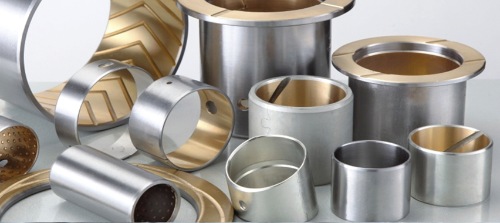
Bimetal Bearings
2. What Is the Application of Bimetal Bearing?
Bimetal bearings have the following applications.
You can use the bimetal bearings in:
- Agricultural machinery
- For heavy-duty truck applications such as engines and brakes.
- After-treatments for automobile exhaust
- Engines for heavy-duty work
- Trucks that carry a lot of weight
- Hydraulic cylinders are a type of hydraulic cylinder.
- Industrial lift equipment.
- Ovens for both industrial and domestic use
- Applications for lifting
- Handling by machine
- Medical devices
- Valves for natural gas and petrochemicals
- Pneumatic devices
- Textile equipment
For applications where the bearing must be machined after mounting, bimetal bearings can be made with a thicker lead bronze coating.
Bushing MFG can customize the layer’s material according to the application’s specific requirements.
3. What Is the Material Used in Bimetal Bushing?
In bimetal bearings, you can choose two metal alloys of your desire.
Mainly, metal such as bronze and copper are used for layering the bimetal bushes. A bronze sliding layer is usually wrapped around a two-layered bimetal bearing.
You can layer the bimetal bushing with stainless steel, carbon steel, or bronze.
Heavyweights and stress loading conditions are no match for bimetal bearings. It has a high capacity for carrying loads.
Our anti-corrosion bimetal bearings manufactured at Bushing MFG are very simple to operate.
Low carbon steel is used as the base material in bimetal bearings. It is also covered with copper or tin plating on the exterior surface.
Customers can also choose high tin aluminum alloy for layers or any suitable copper layer material.
Bushing MFG can do the thickness of the alloy layer and sintering of any thickness according to the client’s need. However, the standard thickness is 0.25mm-0.3mm.
Inner wall copper layer material is generally CuSn6Zn6Pb3 or CusN6.5P0.1. (i.e., two kinds of tin bronze and two types of lead bronze.)
Four kinds of copper and lead/bronze alloys can be used for making layers in bimetal bearings.
CuPb24Sn4 (Copper, Lead, and Tin):
- It has a high fatigue strength and bearing capacity.
- Impact resistance,
- Due to the high lead content in the alloy and high density, it is prone to lead segregation, which reduces the abrasion resistance of the bushing.
- It may also reduce the strength of the combination of alloy layer and steel back.
- The high-cost copper layer is used in high speed, swing, and rotating wages under bearing conditions.
CuPb10Sn10:
- It has good lubrication performance, wear resistance, and corrosion resistance.
- Suitable for medium to high speed and has a more significant impact on load-bearing.
- The gasket surface pressure is high.
- There is the lateral pressure of the sliding bearing, such as the bimetallic bearing shell, the piston pin set, lining, etc.
CuSn6Zn6Pb3 (Copper, Tin, Zinc, and Lead):
This material allows the bearing to work under general load and medium sliding speed, such as turbines, motors, compressors, piston clutches, connecting rod bushings, rocker arm bushings, and so on.
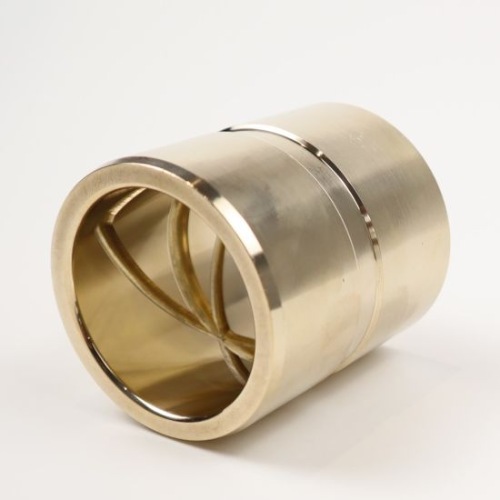
CuSn6Zn6Pb3 Bronze Bushing
Cusn6.5-0.1 (copper and Tin):
These lead-free bimetallic bearings are used in:
- Balance axle bushing
- Gasket
- Internal combustion engine spindle bushing
- Connecting rod bushing,
- Rocker arm bushing,
- Oil pump side friction plate,
- Internal combustion engine bushing of medium and small power,
- Train engine bushing, air press bushing, and refrigerator.
Moreover, aluminum alloy has good corrosion resistance and sliding performance and moderate fatigue strength and bearing capacity.
It can be utilized with soft shafts and is frequently used for small and medium-sized internal combustion engines, railway engines, air compressor bearing sleeves, and other applications.
It is the most suitable substitute for babbitt alloy.
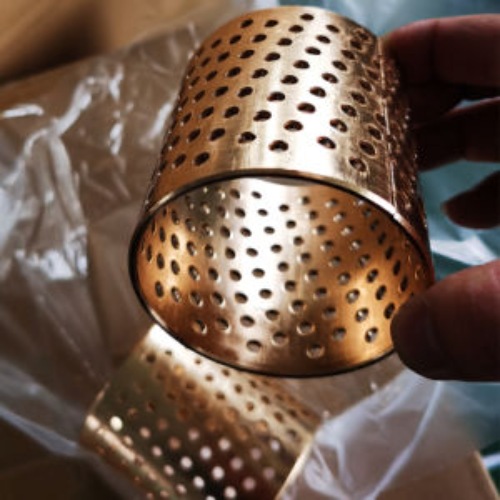
Cusn6.5-0.1Bronze Bushing
4. What Are the Advantages of Using Bimetal Bearings?
Bimetal bearings offer the following advantages.
- Bimetal bearings have a high level of wear resistance.
- They are well-suited to medium-speed, medium-load, low-speed, and high-load situations.
- Various oil grooves, pockets, and holes can be processed on the friction surface using unique technologies to adapt to diverse lubrication circumstances.
- Automotive engines, chassis, motorcycle clutches, gear pump wipers, and lifting equipment have all benefited from our bi-metal bearings.
For further information, we can provide you the detail videos regarding the bimetal bearings at Bushing MFG.
5. What Are Self-Lubricating Bimetal Bearings?
One of the oil-free or self-lubricating bearings is the bimetal bearing.
Bimetal bearings are made of a high-quality low-carbon steel backing with a lead-tin-bronze alloy sintered on the surface.
It is a bimetal merged with copper and steel after much high-temperature sintering and dense rolling processes.
Bimetal bearings are a new type of lubricating bearing that combines the advantages of metal bearings and self-lubricating bearings.
The weight is supported by the metal base, which is lubricated using a specially developed solid lubricant.
It has a high load-bearing capacity and is impact-resistant.
It has high-temperature resistance and has an excellent self-lubricating ability.
It’s especially well-suited to situations where lubrication and formation of an oil film are problematic, such as oversized loads, low speeds, reciprocation, or swing.
It also has resistance against water erosion and other acid solutions.
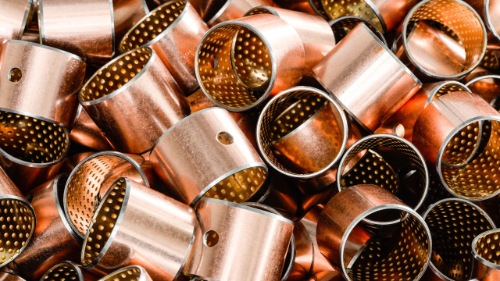
Self-Lubricating Bimetal Bearings
6. What Is Wear Resistance of Bimetal Bearings?
The advantage of bimetal bearings is their high wear resistance.
It’s especially well-suited to medium and low-speed applications.
Grooves, oil holes, and multiple oils can be created on the friction surface using a unique method to adapt to diverse lubrication conditions.
Automobile engines, chassis, motorbike clutches, gear pumps, cleaning, and elevator equipment are only a few of the applications of bimetal bearings.
Metal substrates are loaded with solid lubricants in lubricated bimetal bearings.
Bimetal bearings have high wear resistance. It means that they cannot be damaged easily.
The high-temperature resistance, and self-lubricating properties, among other things.
Due to the wear resistance, bimetal bearings are particularly well suited to large loads and low speeds.
They are also suitable for reciprocating or swinging motions, such as lubrication and oil film formation.
Moreover, they act well against acids and corrosion.
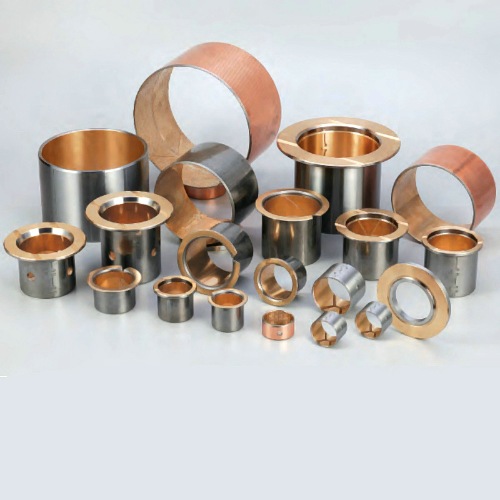
High-Grade Bimetal Bushings
7. What Are the Various Sizes of Bimetal Bearings?
Bushing MFG manufactures bimetal bearings in several sizes and materials, including metal, plastic composites, and a mix of the two.
Some applications necessitate oversized bearings, whereas others require small bushings.
We make all of the sizes you require, taking into account shifting trends.
Bushings do not exceed several inches in length; the standard size ranges from 0.8 to 2-4 inches.
Our self-lubricating bimetal bearings are available in metric standard sizes.
Our customers regularly request this type of product with a quick lead time. The vast majority of our in-stock items can be shipped on the same day.
Bimetal self-lubricating metric bushes are available upon request.
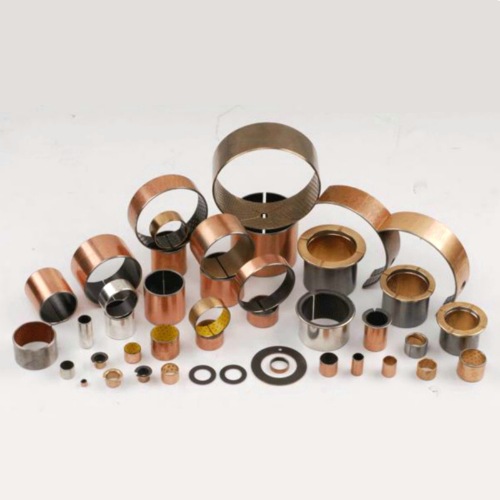
Variable Bearing Sizes
8. Can I Get Customized Bimetal Bearings?
Bimetal Bearing Bushes are customer-specified products with high-performance and environmentally favorable dual metal bearings.
We can modify bimetal bearings to meet your specific needs.
Bushing MFG is a fast-paced manufacturer of self-lubricated bearings of all varieties.
All of the items are highly innovative and made of high-quality materials.
For many years, Bushing MFD has been the best maker of bimetal bushings. We have experienced bushing manufacturers who can provide you with the highest quality material.
You must share the design, quality, material, and size of your bimetal bushing with Bushing MFG, and you will receive a custom


 bellazou926@gmail.cpom
bellazou926@gmail.cpom 



